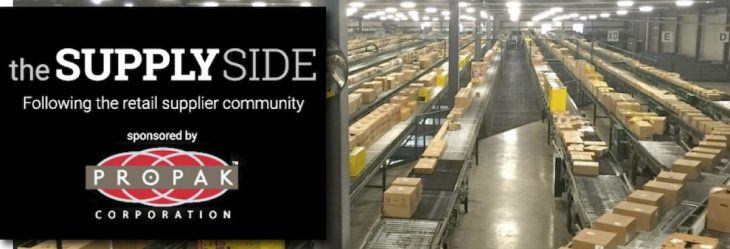The Supply Side: Supply chain challenges follow evolution, disruption in the retail industry
by November 6, 2017 5:32 pm 798 views

The retail industry is undergoing an evolution and the supply chain, the backbone that holds up the important sector, also faces turmoil and challenges, according Colby Beland, vice president of sales and marketing for Fayetteville-based Casestack.
Beland was one of three panelists who spoke about the challenges during the “Location Matters in Global Economy” conference held Monday (Nov. 6) in Fayetteville. The conference also featured economists from several districts of the Federal Reserve Bank as well as officers from the Global Interdependence Center that co-sponsored the day-long event with the University of Arkansas.
Beland described a supply chain facing a substantial reduction in transportation capacity in the next couple of years which has already increased shipping costs up to 20% since the recent hurricanes that hit the southeastern part of the U.S.
He described a perfect storm brewing with the regulation of electronic logs for the trucking industry that will take effect in December hitting an already tightening truckload capacity. He said the shortage of drivers will worsen as more of them could move into the construction industry for all the rebuilding necessary from hurricane destruction.
“The driver shortage is real and rebuilding this employment sector is going to take a long while. In the meantime, we are facing the largest capacity crunch that we have seen a long time. We see low unemployment numbers, nationally it looks as it we are at full employment, and this is making it very difficult for transportation companies to recruit drivers,” Beland said.
He anticipates supply chain costs will escalate dramatically over the next few years. Beland said the Amazon effect is also ripping through the supply chain making it hard to know how much inventory retailers will need to carry.
“Retailers don’t have a clear picture of what their inventory is going to look like. We see fewer stores being built and retailers are reducing their inventory counts at different levels, this makes it very hard to plan for the supply chain,” Beland said.

RETAIL JOBS DECLINING
Ann Bordelon, chief financial officer for Mitchell Communications, spent nearly two decades in various financial roles at Wal-Mart Stores, until recently joining Mitchell. She spoke about the woes of a retail industry that is overstored as more sales are moving online.
She said 89,000 retail jobs were lost in the first seven months of this year and the closure announcements continue. She said the evaporation of retail jobs will impact every U.S. community across the country. Last week Sears announced it was closing its stores in Fayetteville and Fort Smith, leaving a large empty space that at one-time anchored shopping malls in both cities.
Bordelon said said closures are all too common. She also pointed to the growth in subscription sales reducing the need go the retail store. Citing the example of Harry’s and Dollar Shave and the impact to Gillette’s in-store sales, she said customers will likely never return to Gillette no matter how much they reduce the prices.
“Look at the photo section in a new Walmart Supercenter. In most cases it’s been reduced to an ATM-like kiosk because most of that industry has moved online.” Bordelon said.
Talk Business & Politics asked Bordelon what retailers and suppliers might do to protect margins against the Amazon effect and the so-called race to the bottom on prices. She said whoever figures out final-mile at a sustainable rate will be the winner. She said taking costs of out the system by looking for efficiencies in supply chain, packaging product formulation and marketing is a help.
CONSUMERS MORE EDUCATED
Rich Lawrence, vice president of special markets for Helen of Troy, said retailers will protect their margins by asking suppliers to shoulder more of the costs. He said private label is being pushed by retailers like never before and that also going to squeeze suppliers.
He said retailers set the sales price and then squeeze suppliers with fees when the margin is eroded. He doesn’t think that will soon abate. One aspect that concerns him is price transparency for all items manufactured in China and sold there cheaply, then marked up to sell in the U.S. He said as consumer find that out, they will revolt against paying $100 for a hairdryer in the U.S. that they get from a Chinese marketplace seller for $25. He said this is another erosion of margin facing suppliers who manufacture goods in China.
He said consumers are more educated about price and that is one reason off-price retailers like Ross and TJ Maxx are doing better than typical department stores. The same concerns are there in grocery between Aldi and Lidl and traditional grocery retailers, he said.
All three panelists said technology will continue to impact the supply chain and retail sectors but Lawrence said there is going to be a tipping point. He jokingly asked the attendees if they had heard of Amazon Spoon. He said Walmart can deliver it to your refrigerator but Amazon says it will actually spoon feed you.
“This back and forth between Amazon and Wal-Mart is going to hit a wall. Some of these ideas may be good in theory, but not very actionable in the end,” he said.
–––––––––––––––––
Editor’s note: The Supply Side section of Talk Business & Politics focuses on the companies, organizations, issues and individuals engaged in providing products and services to retailers. The Supply Side is managed by Talk Business & Politics and sponsored by Propak Logistics.
